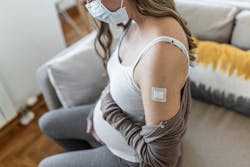Vaccinating women infected with COVID during pregnancy prior to delivery provides antibodies to newborns
Women with COVID in pregnancy who are subsequently vaccinated after recovery, but prior to delivery, are more likely to pass antibodies on to the child than similarly infected but unvaccinated mothers are. Researchers who studied a mix of vaccinated and unvaccinated mothers found that 78% of their infants tested at birth had antibodies.
Of these infants, 3 of 4 born to unvaccinated mothers had evidence of antibodies while all of those from vaccinated mothers carried COVID antibodies. At 6 months, 52% of the babies, from both vaccinated and unvaccinated mothers, carried antibodies. The decrease in that percentage is due to a combination of infants of vaccinated mothers carrying more antibodies than those from unvaccinated mothers at birth, a waning of detectable antibodies over time, and some participants leaving the trial prior to the 6-month point. over time. Some infants born to unvaccinated mothers had no detectable antibodies at birth.
There are currently no approved COVID vaccines for newborns under the age of 6 months. Transplacental transfer of antibodies to the infant from the mother during pregnancy may provide protection against COVID during the first 6 months of life. Also, little is known about the impact of mothers’ COVID severity, timing of infection and subsequent vaccination on both maternal and infant antibodies over time.
In a longitudinal study, researchers collected blood samples from pregnant women and infants at the time closest to infection, birth, and 6 months postpartum: samples were collected from 148 women and 122 newborns at birth, and another 45 maternal and 48 infant samples were taken at 6 months. Some participants dropped out of the trial during the intervening time, and some mothers gave birth to twins or triplets, accounting for the differences in numbers tested.
This is one of the largest longitudinal studies of mothers and infants with a history of COVID infection during the mother’s pregnancy. However, the researchers note some limitations to the study. Due to the study’s design, associations may not imply causation, they did not have vaccinated controls without a history of COVID infection for comparison, and they had a high attrition rate in study subjects by the 6-month point.
In this analysis, the mother’s vaccination status was the strongest predictor of antibody transfer to the infants, who were more likely to have detectable antibodies at birth. This may be an effective strategy to boost COVID antibodies not just in mothers, but in infants before they are eligible for the vaccine at 6 months of age.

